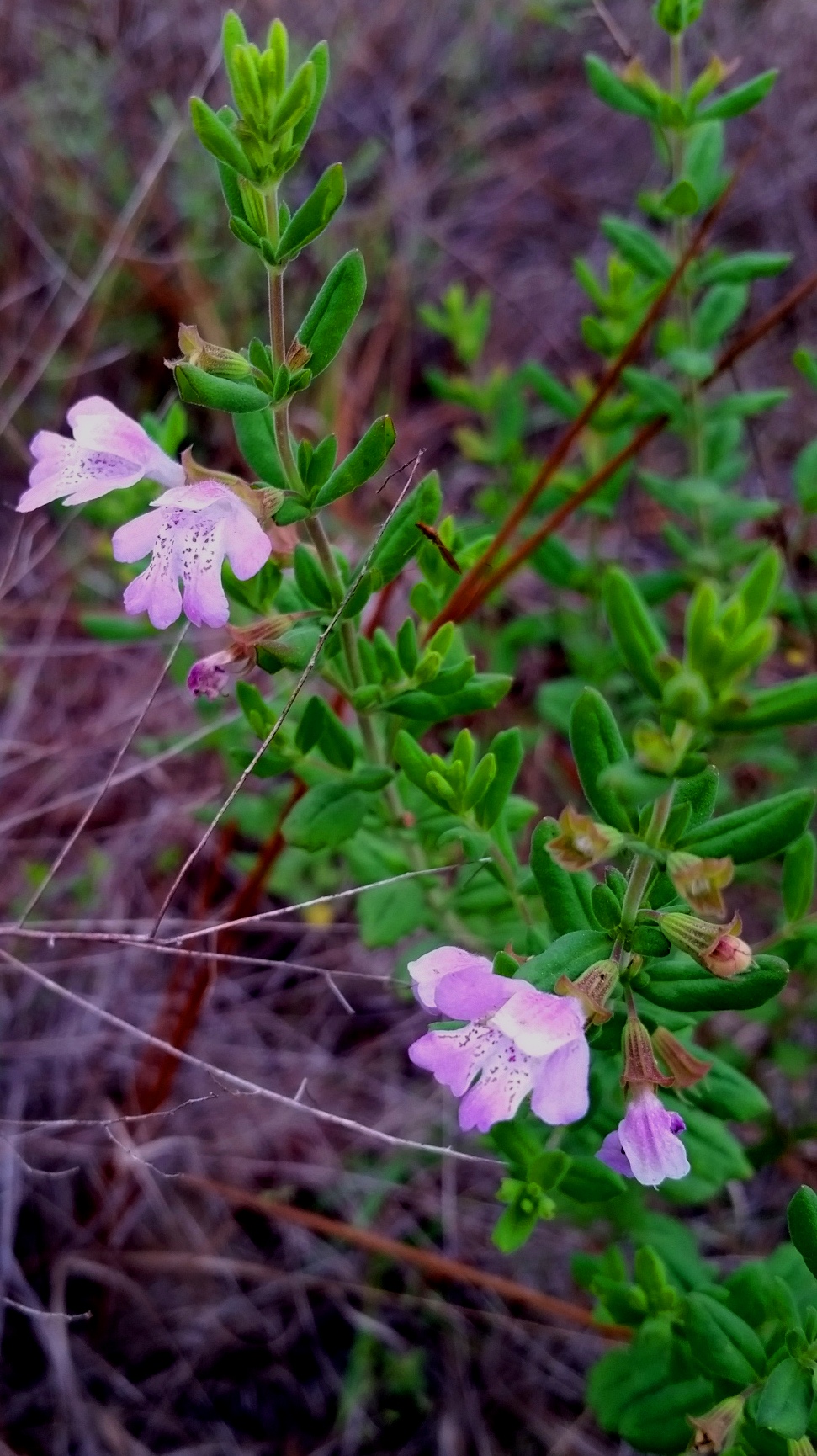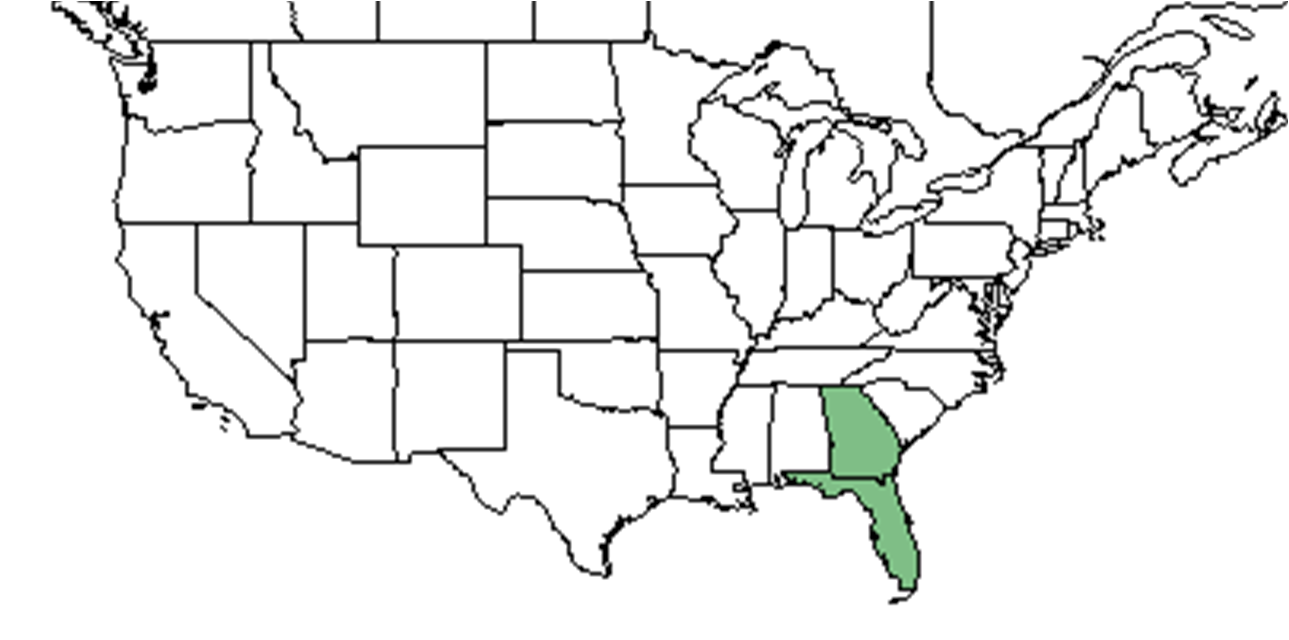Difference between revisions of "Calamintha dentata"
HaleighJoM (talk | contribs) (→Ecology) |
|||
| (20 intermediate revisions by 9 users not shown) | |||
| Line 3: | Line 3: | ||
{{taxobox | {{taxobox | ||
| name = Calamintha dentata | | name = Calamintha dentata | ||
| − | | image = | + | | image = Calamintha dentata MMS March 2015.jpg |
| − | | image_caption = | + | | image_caption = Photo taken by Michelle Smith at TNC's Apalachicola Bluffs and Ravines Preserve |
| regnum = Plantae | | regnum = Plantae | ||
| divisio = Magnoliophyta - Flowering plants | | divisio = Magnoliophyta - Flowering plants | ||
| Line 14: | Line 14: | ||
| binomial = ''Calamintha dentata'' | | binomial = ''Calamintha dentata'' | ||
| binomial_authority = (Weath.) Small | | binomial_authority = (Weath.) Small | ||
| − | | range_map = dist_CALA_DENT. | + | | range_map = dist_CALA_DENT.png |
| range_map_caption = Natural range of ''Calamintha dentata'' from USDA NRCS [http://www.plants.usda.gov Plants Database]. | | range_map_caption = Natural range of ''Calamintha dentata'' from USDA NRCS [http://www.plants.usda.gov Plants Database]. | ||
}} | }} | ||
| − | Common | + | Common names: Florida calamint; toothed savory |
| + | |||
| + | ==Taxonomic notes== | ||
| + | Synonyms: ''Satureja dentata'' (Chapman); ''Clinopodium dentatum'' (Chapman) Kuntze.<ref name="weakley">Weakley, A.S. 2015. Flora of the southern and mid-atlantic states. Working Draft of 21 May 2015. University of North Carolina at Chapel Hill, Chapel Hill, North Carolina.</ref> | ||
| + | |||
| + | Varieties: none.<ref name="weakley">Weakley, A.S. 2015. Flora of the southern and mid-atlantic states. Working Draft of 21 May 2015. University of North Carolina at Chapel Hill, Chapel Hill, North Carolina.</ref> | ||
| − | |||
==Description== | ==Description== | ||
<!-- Basic life history facts such as annual/perrenial, monoecious/dioecious, root morphology, seed type, etc. --> | <!-- Basic life history facts such as annual/perrenial, monoecious/dioecious, root morphology, seed type, etc. --> | ||
==Distribution== | ==Distribution== | ||
| + | |||
==Ecology== | ==Ecology== | ||
===Habitat=== <!--Natural communities, human disturbed habitats, topography, hydrology, soils, light, fire regime requirements for removal of competition, etc.--> | ===Habitat=== <!--Natural communities, human disturbed habitats, topography, hydrology, soils, light, fire regime requirements for removal of competition, etc.--> | ||
| − | ===Phenology=== <!--Timing off flowering, fruiting | + | ''C. dentata'' has been found in sandy pine plantations, scrub sand ridges, white cedar swamp, dry pinelands, and turkey oak barrens.<ref name="MUR"> Murray State University Herbarium accessed using Southeastern Regional Network of Expertise and Collections (SERNEC) data portal. URL: http://sernecportal.org/portal/collections/index.php Last accessed: June 2021. Collectors: John R. Bozeman States and Counties: Florida: Liberty.</ref><ref name="FLAS"> University of Florida Herbarium accessed using Southeastern Regional Network of Expertise and Collections (SERNEC) data portal. URL: http://sernecportal.org/portal/collections/index.php Last accessed: June 2021. Collectors: L.E. Arnold, Reed Crook, |
| − | ===Seed dispersal=== | + | R.A. Davidson, R.K. Godfrey, S.C. Hood, and R.F. Thorne. States and Counties: Florida: Liberty and Walton.</ref> It is also found in disturbed areas including old fields and along roadsides.<ref name="FLAS"/> |
| − | ===Seed bank and germination=== | + | |
| − | ===Fire ecology=== <!--Fire tolerance, fire dependence, adaptive fire responses--> | + | Associated species: ''Eupatorium compositifolium, Haplopappus divaricatus, [[Polypremum procumbens]], Rhynchosia cistifolia, Froelichia floridana, [[Pityopsis adenolepis]], Diodia teres, [[Rubus cuneifolius]], Andropogon virginiana var. glauca, [[Quercus incana]], Pinus, Liatris'' and ''Wahlenbergia marginata''.<ref name="FLAS"/> |
| − | ===Pollination=== | + | |
| − | === | + | ===Phenology=== <!--Timing off flowering, fruiting, and environmental triggers. Cite PanFlora website if appropriate: http://www.gilnelson.com/PanFlora/ --> |
| − | ===Diseases and parasites=== | + | ''C. dentata'' has been observed flowering from March to October with peak inflorescence in May and June.<ref>Nelson, G. [http://www.gilnelson.com/ PanFlora]: Plant data for the eastern United States with emphasis on the Southeastern Coastal Plains, Florida, and the Florida Panhandle. www.gilnelson.com/PanFlora/ Accessed: 7 DEC 2016</ref> |
| − | ==Conservation and | + | <!--===Seed dispersal===--> |
| − | == | + | <!--===Seed bank and germination===--> |
| + | <!--===Fire ecology===--> <!--Fire tolerance, fire dependence, adaptive fire responses--> | ||
| + | <!--===Pollination===--> | ||
| + | <!--===Herbivory and toxicology===--> | ||
| + | <!--===Diseases and parasites===--> | ||
| + | |||
| + | ==Conservation, cultivation, and restoration== | ||
| + | |||
| + | ==Cultural use== | ||
| + | |||
==Photo Gallery== | ==Photo Gallery== | ||
| + | <gallery widths=180px> | ||
| + | </gallery> | ||
| + | |||
==References and notes== | ==References and notes== | ||
Latest revision as of 20:12, 15 June 2022
| Calamintha dentata | |
|---|---|

| |
| Photo taken by Michelle Smith at TNC's Apalachicola Bluffs and Ravines Preserve | |
| Scientific classification | |
| Kingdom: | Plantae |
| Division: | Magnoliophyta - Flowering plants |
| Class: | Magnoliopsida - Dicotyledons |
| Order: | Lamiales |
| Family: | Lamiaceae ⁄ Labiatae |
| Genus: | Calamintha |
| Species: | C. dentata |
| Binomial name | |
| Calamintha dentata (Weath.) Small | |

| |
| Natural range of Calamintha dentata from USDA NRCS Plants Database. | |
Common names: Florida calamint; toothed savory
Contents
Taxonomic notes
Synonyms: Satureja dentata (Chapman); Clinopodium dentatum (Chapman) Kuntze.[1]
Varieties: none.[1]
Description
Distribution
Ecology
Habitat
C. dentata has been found in sandy pine plantations, scrub sand ridges, white cedar swamp, dry pinelands, and turkey oak barrens.[2][3] It is also found in disturbed areas including old fields and along roadsides.[3]
Associated species: Eupatorium compositifolium, Haplopappus divaricatus, Polypremum procumbens, Rhynchosia cistifolia, Froelichia floridana, Pityopsis adenolepis, Diodia teres, Rubus cuneifolius, Andropogon virginiana var. glauca, Quercus incana, Pinus, Liatris and Wahlenbergia marginata.[3]
Phenology
C. dentata has been observed flowering from March to October with peak inflorescence in May and June.[4]
Conservation, cultivation, and restoration
Cultural use
Photo Gallery
References and notes
- ↑ 1.0 1.1 Weakley, A.S. 2015. Flora of the southern and mid-atlantic states. Working Draft of 21 May 2015. University of North Carolina at Chapel Hill, Chapel Hill, North Carolina.
- ↑ Murray State University Herbarium accessed using Southeastern Regional Network of Expertise and Collections (SERNEC) data portal. URL: http://sernecportal.org/portal/collections/index.php Last accessed: June 2021. Collectors: John R. Bozeman States and Counties: Florida: Liberty.
- ↑ 3.0 3.1 3.2 University of Florida Herbarium accessed using Southeastern Regional Network of Expertise and Collections (SERNEC) data portal. URL: http://sernecportal.org/portal/collections/index.php Last accessed: June 2021. Collectors: L.E. Arnold, Reed Crook, R.A. Davidson, R.K. Godfrey, S.C. Hood, and R.F. Thorne. States and Counties: Florida: Liberty and Walton.
- ↑ Nelson, G. PanFlora: Plant data for the eastern United States with emphasis on the Southeastern Coastal Plains, Florida, and the Florida Panhandle. www.gilnelson.com/PanFlora/ Accessed: 7 DEC 2016